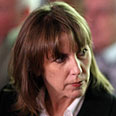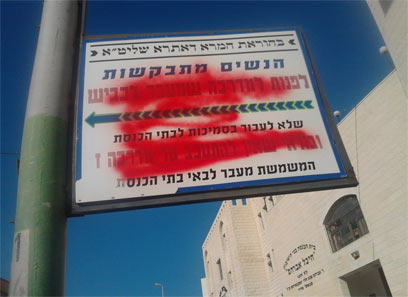
Livnat: Women's exclusion is violence
Minister strongly condemns manifestations of exclusion of women from public life, but accepts certain realities within haredi sector. 'I'm not sure it bothers me if in Beitar Illit they want to segregate their bus lines,' she tells Ynet
Culture and Sports Minister Limor Livnat on Saturday condemned the phenomenon of women's exclusion from the public sphere but also accepted certain realities in strictly-haredi towns. "I'm not sure I mind it if they decide to segregate bus lines in Modiin Illit or Beitar Illit," she told Ynet. "It’s their way of life. If it doesn't bother any woman, I'm not sure it bothers me."
Related stories:
- PM orders firm hand against women's exclusion
- 'Fight against women's exclusion is everyone's fight'
- 'Women in Front' campaign meets haredi resistance
Livnat said that what does bother her immensely is separation between women and men in places were non-haredi people reside.
"I don't want to educate them to lead a different life, they have their customs," she said. "I don’t think we need to be patronizing, to say it's not OK, or that it's primitive. I don't think it's right but we must not force this lifestyle on whoever is unwilling to live that way. A bus driving from Ashdod to Jerusalem with non-haredi passengers must not be segregated."
Addressing the claim that haredi women fail to come out against their exclusion because they lack the courage or the power to do so, Livnat said: "I'm not sure. I meet opinionated women, they are not miserable. They don't want to rub up against men and say they are comfortable. As far as buses are concerned – coercion accompanied by violence is out of line but when it's done willingly, and many women do it willingly – then I have no problem with it."

A fight the crosses political boundaries (Photo: Moti Kimchi)
Nevertheless, Livnat stressed that as far as she's concerned exclusion of women is violence against women. The minister was particularly outraged by a practice in certain cemeteries where Chevra Kadisha prevents women from eulogizing the dead and walking behind the deceased brought for burial. "This is really counter religion," Livnat protested. The minister said she had only recently been exposed to this phenomenon during a funeral in Ofakim.
But despite the growing exclusion of women, Livnat draws optimism from the public protest on the matter. "We have today 24 women Knesset members – more than ever before. There is better representation, but also a step backwards and this thankfully is prompting greater public outrage.
"Once it was considered shameful to be a feminist. Now there is a much larger group that is concerned by the radicalization in the haredi sector. This is a positive thing, because it means we can stop it."
"Where women are harassed it is very grave indeed," she said. "Where girls in a state-religious school are being harassed there is a crime. We cannot allow this. We cannot allow a city which is not entirely haredi to put signs for separate sidewalks. There is no discussion on the matter. When a woman wants to accompany her husband, brother or father in his last journey – that cannot be prevented."
Livnat said, "There are women who are willing to walk separately but not in Ofakim. There it is being forced on everyone – haredi women and others too. No one will stop women who live this way but Chevra Kadisha cannot force it."
'Action is being taken'
The minister also noted an incident where two female researchers who won a award as part of a Health Ministry event were not allowed to get on the podium to accept it and were asked to sit in the gallery while a man accepted it on their behalf.
According to Livnat, the issue of women's exclusion was not on the agenda of any past administration as it is now.
"I'm sorry for what's happened, but action is being taken as a result," she remarked. Livnat claimed that she and Prime Minister Benjamin Netanyahu have been discussing the issue in recent weeks, adding that she herself had assembled the Ministerial Committee for the advancement of women in Israel to debate the issue.

Beit Shemesh sign instructing women to walk in separate sidewalk (Photo: Naftali)
Livnat mentioned that the ministers had approved two of the government's resolutions. One of the decisions called for the Ministry of Religious Affairs and Justice Ministry to draft a clause in Chevra Kadisha's license clearly stating that women can mourn the dead and walk behind the coffin of their loved ones in cemeteries.
The second resolution concerns the recent incident at the Health Ministry's research excellence award ceremony, in which two of the winners, who were women, were not invited to the stage to receive their award. Livnat has asked Civil Service officials to publish instructions forbidding any exclusion of women in ceremonies.
The culture and sports Minister has also chosen to set up a team in charge of proposing helpful ways of dealing with the issue of women's exclusion in the public sphere.
"There are some issues which were there before and there are some entirely new things," said Livnat. "The idea that a governmental ministry awards both male and female researchers but makes the women sit in the gallery and not permit them to receive their own award, and the are forced to send someone else in their place… that's deterioration and radicalization, which wasn't there in the past."
- Receive Ynetnews updates directly to your desktop










